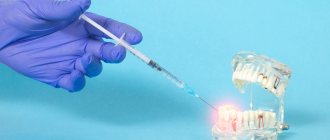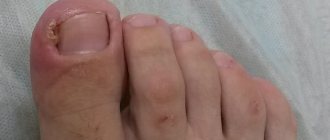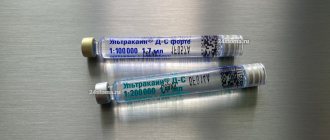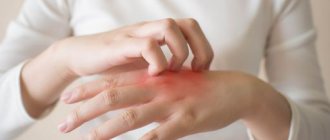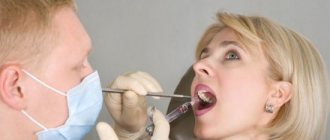From this article you will learn:
- what lidocaine-based drugs are used in dentistry,
- How much stronger is lidocaine than novocaine?
- What anesthetics are even stronger than lidocaine.
The article was written by a dental surgeon with more than 19 years of experience.
Lidocaine is a drug that is a local anesthetic, which is used for pain relief during the treatment and extraction of teeth, as well as when opening purulent abscesses. The analgesic effect of this drug is approximately 2 times higher than the effectiveness of novocaine, but 1.5-2 times inferior to ultracaine. For lidocaine, the instructions for use of the drug in dentistry contain information about the following forms of release:
- lidocaine in ampoules and carpules,
- lidocaine spray,
- lidocaine gel.
Below we will analyze in detail the use of each form, their pros and cons.
Lidocaine spray - how effective it is for toothache
Toothache is one of the most severe and painful. In some cases, even pharmacy painkillers are not able to bring relief. Of course, you cannot tolerate such severe discomfort - you need to immediately run to the doctor. However, it is not always possible to promptly seek medical help, and then the only option to relieve acute toothache is to take painkillers. One of these drugs is Lidocaine. The product is available in various forms, including a spray for self-use. In general, this drug in dentistry is often used as an anesthetic before treatment, which indicates its unconditional effectiveness. Today we’ll talk about the effect of “Lidocaine” on teeth, its release forms, indications for use, and we will also provide simple and understandable instructions for using the spray.
What to do if your tooth hurts
First aid for a toothache begins with identifying the causes of the discomfort and eliminating irritating factors. Toothache can be caused by various irritants:
- Hot or cold food and drinks;
- Cold air;
- Sweet, sour, salty foods and drinks;
- Pressure drop;
- Head position;
- By pressure or other influence;
- Food getting into the carious cavity;
- Other mechanical effects on the tooth.
As soon as it becomes clear why the tooth hurts at a particular moment, it is necessary to stop the irritating influence. After this, consult a doctor for help. If the appointment is postponed for a long time, then it is worth taking painkillers.
In what forms is the drug produced, components
Today, the drug is produced in 3 forms: in ampoules - an injection for the tooth, in the form of a gel with Lidocaine and a spray for the teeth. Further in this article we will concentrate on considering the spray, which is a colorless liquid, but with a pleasant menthol scent. The main active ingredient is the anesthetic of the same name - its concentration in a solution of 3.8 g (one bottle) is 4.8 mg. The composition of the drug also includes the following substances:
- propylene glycol,
- mint oil,
- ethanol solution – 96%.
A standard bottle holds approximately 650 doses. The kit includes a glass jar with a dispenser, a spray bottle and instructions for using the product.
Pharmacology and pharmacokinetics - highlights
The active component of the spray effectively reduces the susceptibility of nerve endings, and this happens by blocking the conduction of the corresponding impulses. Acting systemically, the substance also provides an effect similar to that of antiarrhythmic drugs, but its use for therapeutic purposes does not in any way affect the functioning of the heart. If Lidocaine is sprayed near the respiratory tract, it also prevents coughing and gagging.
The drug also prevents coughing and vomiting.
The drug is quickly absorbed, and if a small amount of the drug enters the gastrointestinal tract, the active component is inactivated. The action occurs within 5-10 minutes. Metabilized in the liver by 90-95%.
In what cases is it used?
In dental practice, Lidocaine is used in various forms, including as a spray. The drug helps to anesthetize a limited area of the mucous membrane, and also promotes vasodilation without tissue irritation. Below are the main indications for use:
- for dental treatment in the presence of any dental diseases,
- for tooth extraction,
- for problematic teething,
- with stomatitis,
- as part of professional cleaning and removal of deposits,
- before opening cystic neoplasms.
The drug is usually administered by injection.
To eliminate sensitivity before treatment, the drug is usually administered by injection. In the form of a spray, it is sometimes applied before an anesthetic injection. Many people are interested in how long dental anesthesia lasts and wears off. Usually the effect occurs within 5 minutes, lasts for 1-2 hours, after which sensitivity is restored. Therefore, it is not recommended to eat for some time after treatment, since you can accidentally injure your tongue. The spray is also widely used for toothache at home.
Lidocaine in ampoules -
Available in ampoules of 2 ml. Composition of the drug: 1 ml of solution contains 20 mg of lidocaine hydrochloride (this corresponds to a 2% solution), as well as excipients - 6 mg of sodium chloride and sodium hydroxide solution, + water for injection.
Lidocaine: reviews This anesthetic once replaced novocaine, and was several times stronger than it. You need to understand that novocaine has practically no effect in inflamed tissues during suppuration. The effect of lidocaine does not depend on the presence or absence of inflammation.
Typically, a dose of 4-5 ml of lidocaine is used for anesthesia in dentistry (if lidocaine is used without the addition of adrenaline). The duration of action from the moment of injection is from 30 to 90 minutes, which depends on numerous factors: the speed of blood flow, which washes the anesthetic out of the tissues, the type of anesthesia (in the upper jaw, anesthesia lasts significantly less than in the lower jaw with conduction anesthesia).
However, now we can safely say that lidocaine, like novocaine, are anesthetics of the past. Now it has been replaced by longer-lasting and deeper-acting anesthetics based on Articaine. These anesthetics include, for example, Ultracain, Septanest, Ubistezin and others. These anesthetics are several times stronger than lidocaine, and their duration of action is also several times longer.
The undoubted advantages of lidocaine include:
- low cost, which makes it a good free anesthetic in government clinics (10 ampoules cost about 40 rubles in a pharmacy),
- antiarrhythmic effect on the heart, which makes it the drug of choice for the treatment and removal of teeth in patients with cardiac arrhythmias.
In what situations is Lidocaine in spray form contraindicated?
There is a list of contraindications to the use of the anesthetic in question. Such pathological phenomena include the following conditions:
- intolerance to the active substance,
- allergy to anesthetic,
- if the patient has had seizures in the past as a result of taking any form of lidocaine,
- frequent fainting,
- bradycardia,
- weak sinus node
- some pathologies of the heart and blood vessels.
The drug is not used when taking impressions of teeth.
Also, the spray is not used when taking impressions of teeth - the risk of penetration of the material into the respiratory system is too great. Before using the product, the specialist must make sure that the patient has no contraindications.
Possible causes of toothache
Caries at different stages can cause pain in the teeth. As a result of poor oral hygiene, tartar forms on the teeth, and as a result, caries develops. Gradually, the tooth enamel will be destroyed, and the internal sensitive tissues of the tooth will begin to be affected. In the first stages of caries development, the tooth may react painfully to hot and cold. When the nerve is already inflamed, toothache may occur as a result of food or water coming into contact with it. Self-medication will not help here: the cause of pain can only be eliminated in a doctor’s office;
abscess or gumboil. Purulent deposits form directly in the gums. In this case, the pain in the teeth is quite sharp and throbbing. There is severe swelling in the oral cavity; in particularly severe cases, the entire cheek may become swollen;
Pulpitis is a logical continuation of advanced caries, which causes severe pain in the teeth. When a tooth hurts due to pulpitis, unexpected severe attacks can be experienced at any time of the day or night, with irradiation into the ear or temple;
Mechanical damage . Tooth trauma, chipped enamel, damage to the crown of the tooth - all this will inevitably lead to pain. If the enamel is damaged, but the nerve remains intact, then pain may not occur immediately, but if you do not consult a doctor in a timely manner, an inflammatory process of the pulp may begin;
Various gum diseases - periodontitis, periodontitis, exposure of the necks of teeth. All these diseases often begin with bleeding gums and have very serious consequences, including tooth loss. Therefore, they definitely require treatment at the dentist’s office.
Instructions and dosage
Lidocaine spray is intended for spraying onto the mucous surface in the problem area where sensitivity needs to be blocked. Let's figure out how to use it correctly and how to use Lidocaine to numb a tooth. The scheme here is very simple: before applying the drug, the bottle needs to be shaken thoroughly, while holding it strictly vertically. 3-5 sprays are enough to provide the required degree of anesthesia and prevent the absorption of too high concentrations of substances into the blood.
If we are talking about anesthetizing an area of the oral mucosa in a child, then we should do it differently. To begin with, the product must be sprayed onto a small piece of gauze, which must then be applied to the affected area. This method of applying the product is used so as not to inadvertently scare the baby, and also not to provoke a burning sensation in his mouth. For patients suffering from impaired liver and kidney function, the dosage should be reduced by at least 40%1.
Folk remedies for toothache relief
The most popular folk remedies are also based on rinsing the mouth with a decoction of various herbs, as well as applying various non-heating compresses to the sore tooth.
The most effective rinses are:
| Sage; |
| Oregano; |
| Oak bark; |
| Chamomile decoction; |
| Calendula; |
| A solution of soda, salt and iodine. |
Pain in the teeth is well relieved by compresses or acupressure on the sore tooth. To do this, use tampons or cotton pads soaked in a medicinal solution or containing a medicinal substance. This may serve as:
- Propolis;
- Essential oils;
- Alcohol or strong alcohol;
- Garlic or onion-garlic mixture with salt.
Do not forget about the simplest and surest way to temporarily numb the tooth that is bothering you. Just take an ice cube out of the freezer and apply it briefly to the sore area. The cold freezes and stops all processes, so the pain will subside for a while. Do not apply cold for a long time, as it can chill the nerve endings.
Possible side effects
We figured out how to use Lidocaine spray, and now we’ll find out what side effects the drug can cause. So, after applying the product, the patient may experience local negative reactions such as burning, redness of the mucous membrane or skin. As a rule, such manifestations disappear on their own immediately after the onset of the analgesic effect. There is also a risk of developing allergies, which can manifest as itching and rashes. In extremely rare situations, anaphylactic shock occurs.
Some anxiety is likely to appear as a reaction of the nervous system. In some cases, the drug leads to a decrease in heart rate or blood pressure. To decide whether it is possible to use Lidocaine anesthesia for dental anesthesia in relation to a particular patient, the doctor must first make sure that he has no contraindications to the use of the drug.
Medicines for toothache
There are many painkillers in pharmacies that are quite effective in helping when a tooth hurts. However, when choosing medications without a prescription and doctor’s recommendations, it is worth remembering that each medicine has a number of contraindications and side effects, so you need to carefully read the instructions, and, if possible, check with pharmacists and pharmacists for information.
The following medications are used to relieve toothache:
| Analgin; | Indomethacin; | Piroxicam; |
| Denebol; | Ketanov; | Solpadeine; |
| Diclofenac; | Ketoprofen; | Tempalgin. |
| Ibuprofen; | Naproxen; |
For local anesthesia and gum disease, Kalgel, Dentinox, Cholisal, Kamistad and Mundizal are suitable. You can also use herbal rinses. They have a calming and antiseptic effect.
Additional instructions for use
Before spraying the spray on the mucous membrane, you need to carefully study the instructions that come with the kit. There are several special points to consider when using Lidocaine. Let's take a closer look at them.
During pregnancy and lactation
The drug is allowed for use in therapeutic doses during pregnancy. However, you should consult your doctor before using it. As for the lactation period, in this case it is better to wait to use the drug while the child is breastfed.
Use during pregnancy should be agreed with your doctor.
Read more about dental treatment during pregnancy in our special article>>>
Use in childhood
Lidocaine in the form of a spray is approved for children, but there are some nuances here. So, for example, it is recommended to apply the drug to children under the age of 2 years in a special way: first, the product needs to be sprayed onto a small gauze pad, and then applied to the area of pain. It should be taken into account that in childhood the swallowing reflex occurs more often than in adults, therefore it is not recommended to spray the anesthetic directly.
This is what an allergy to lidocaine looks like in a child
“The doctor prescribed Lidocaine for us after we had a baby tooth with gumboil removed. He said to apply it on cotton wool and apply it to the swollen gum so that it doesn’t hurt too much. We used it for just a couple of days, everything healed quickly, and the child did not complain of pain. Of course, you’d better consult your doctor about this, but in general I know for sure that the spray can be used for children...”
Irina V., Penza, from correspondence on the woman.ru forum
For liver problems
The drug should be used with extreme caution by people suffering from renal and liver failure. As mentioned above, the therapeutic dosage in this case should be reduced by at least 40%. In addition, in such a situation, using the spray without prior approval from a doctor is strictly contraindicated. This restriction also applies to patients with arterial hypertension and epilepsy.
In old age
Elderly people should also be careful with the anesthetic. The spray cannot be used without a doctor's prescription. There is a possibility that the active ingredient will have a negative effect on the cardiovascular system, so before using the drug you should make sure that the patient does not have any heart problems.
In old age, the drug should be used with caution
Lidocaine may react with other medications, which also needs to be taken into account. However, it does not affect the functioning of the central nervous system, therefore it does not impose any restrictions on activities that require increased concentration.
Acute toothache
It appears very unexpectedly and is rapidly gaining strength. Pain in the teeth can be so severe that a person may lose consciousness for a while.
Severe toothache can occur when eating, while talking, while drinking a cup of coffee, when clenching your jaw, turning or tilting your head, climbing stairs, and even just while breathing. During each of these actions, the sensitive tooth will encounter irritants and react with severe pain:
- For hot food or water;
- To cold air;
- To change pressure and increase blood circulation.
In this case, toothache can be short-term, occur only in the presence of irritating factors and subside after their removal, incessant, or it can appear and disappear.
In any case, toothache is a reason to immediately consult a doctor. Without delay and expectation of serious complications.
How to dispense in pharmacies and storage rules
The drug can be used for 5 years from the date of release. The bottle should be kept in a place protected from direct sunlight, where children cannot get into. Recommended storage temperature varies between 15-25 degrees above zero. The estimated cost of the drug in Moscow ranges from 350 to 380 rubles. "Lidocaine" is dispensed only with a prescription from a doctor, which excludes the possibility of its independent use without prior consultation with a specialist.
How can you replace Lidocaine spray?
Many people are interested in whether there are analogues of Lidocaine and how it can be replaced. In fact, there are quite a lot of drugs with similar effects, but it is difficult to answer the question of which is better than the drug in question. “Lidocaine” is rightfully considered one of the most effective and proven anesthetics, and that is why dentists most often prefer it.
As an alternative, you can consider drugs such as Lidocaine Vial or Xylocaine. Both are available in the form of a spray for external use and are characterized by a rapid onset of effect, as well as a relatively long-lasting and sustainable effect. You can also pay attention to similar drugs in gel form - “Xycain” and “Xylocain”. Remember: you can start taking any medications only after the attending physician gives his consent. Otherwise, there is a risk of causing serious complications.
Tooth pain in children
An adult can still endure toothache. But when a child has a toothache, it is no less painful for a parent, since it can be very difficult to help in such a situation. Pain in the teeth, or more precisely in the gums, begins in the first year of life, when the baby begins to teethe. In this case, there is no need to urgently run to the dentist for help. A scheduled visit to a specialist as part of a scheduled medical examination is sufficient.
Special teething toys with a cooling effect, toothpastes and silicone brushes for babies, as well as local painkillers will help relieve your baby’s toothache during this period. The most popular and safest for the health of children are Kalgel and Cholisal.
If the problem is not teething, and the baby is worried about something else, for example, problems with the gums or oral mucosa, this is a reason to urgently consult a doctor. Even at such an early age, a dentist can diagnose candida or gingivitis. Proper oral hygiene and timely local treatment will help quickly solve the problem.
Your baby may experience toothache when baby teeth emerge. The very first serious disease is bottle caries. An incorrect diet and prolonged use of a bottle can lead to complete loss of the front baby teeth, so regular visits to the dentist are mandatory from an early age.
After bottle caries, the most common caries of baby teeth can develop. It is very difficult to treat such teeth, since fillings do not adhere well to small teeth. It is much easier and more effective to prevent the development of the disease. Today, pediatric dentistry offers many ways to preserve baby teeth.
